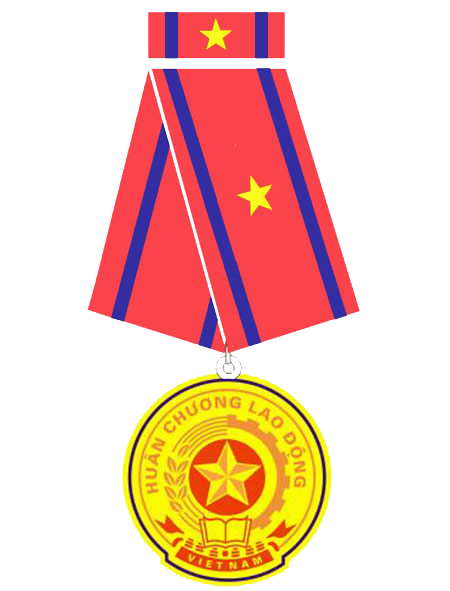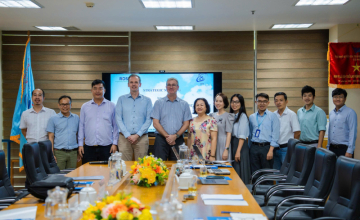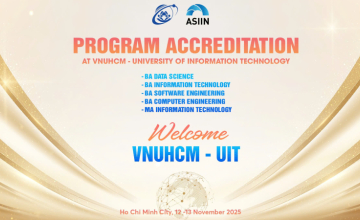1. Objectives of the training program
1.1 General goals
Training Master of Science with solid basic knowledge and expertise, and professional practice skills; have a comprehensive and systematic thinking method, the ability to approach, organize and solve scientific and technical problems related to the field of Information Security; At the same time, have the ability to communicate and work effectively in multidisciplinary teams and integrate in an international environment, and have the knowledge to continue studying at the doctoral level.
To meet the social need for human resources with high professional capabilities in the field of Computer Networks and Information Security, the goal of the graduate training program in Information Security is to train masters with political and moral qualities; have general knowledge and research methods on Information Security; have the ability to work independently and creatively; Able to discover, research and solve common or specialized practical problems; Able to impart knowledge in the field of Information Security.
1.2 Specific goals
The specific goal of the Information Security master's program is to equip students after graduation:
- Have in-depth knowledge and grasp new technological knowledge about the Information Security industry; Have a synthetic thinking method and apply technological knowledge to solve scientific and technical problems related to the field of Information Security to meet the practical needs of society.
- Have skills to detect and model problems and apply knowledge, modern technical tools, and practical skills to solve posed problems.
- Have skills to work in a multi-industry, multi-field and international application environment, meeting the requirements of projects in the Information Security industry, while being aware of and complying with regulations in the Information Security industry. job.
- Have the ability to work independently and creatively; Be able to discover, research and solve common or specialized practical problems
1.3 Perspectives on building training programs
The University of Information Technology applies theoretical training linked to practice to create Information Security experts who can adapt to the development of science and technology.
The Information Security master's level training program is built according to research orientation and application orientation, specifically:
- Research master's training program: provides learners with in-depth knowledge of the industry and in-depth scientific research methods, learners have full skills in critical thinking, creative thinking and independent research to proactively explore and develop new scientific perspectives, ideas, and treatises on scientific issues or scientific experiments, and be able to perform work in research and teaching positions. teaching, consulting and policy planning or other positions in the field of training; can continue to participate in doctoral training programs. The allocated time focuses heavily on research and thesis writing time. The research results are presented in a scientific article about the results of the master's thesis by the student as the main author;
- Research-oriented master's degree program provides learners with in-depth knowledge of the field and appropriate scientific research methods to be able to independently research and develop scientific perspectives and theories, can initially form scientific ideas, discover, discover and test new knowledge; Able to perform work in research, teaching, consulting and policy making positions or other positions in the field of training; can continue to participate in doctoral training programs;
- Application-oriented master's training program helps learners improve professional knowledge and professional skills; have the ability to work independently and creatively; Have the ability to design products, apply research results, discover, and organize the implementation of complex tasks in professional activities, promote and effectively use specialized knowledge in implementation. Specific jobs, suitable to actual conditions at agencies, organizations, and economic units; You can learn some additional basic industry knowledge and research methods according to the requirements of the doctoral training industry to continue participating in the doctoral training program.
The program is designed and built based on:
- Recommendations of the computer organization ACM (Association for Computing Machinery).
- The approach to building curriculum is CDIO.
- Refer to graduate training programs in the field of Information Security of member schools of National University of Ho Chi Minh City. Ho Chi Minh and Hanoi National University.
- Refer to postgraduate training programs in Information Security from universities around the world such as:
· London Metropolitian University, UK
· Monash University, Australia
1.4 Job opportunities after graduation
After graduating, students can take on specialized positions in information security such as:
- Security and safety administrators, information security solution integration experts, information security development experts, information security lecturers and researchers.
- Director of information security, head of information security department.
- Researcher at institutes, centers, research agencies or teaching at universities and colleges.
- For research-oriented and research-oriented master's training programs, the academy can continue.
2. Requirements for learners
To study the Master's program in Information Security, students must comply with the admission regulations below.
Right industry, suitable industry, close industry, and different industry from Information Security industry
|
No. |
Group |
Industry |
|
1 |
Right industry, approriate industry |
Computer Networks and Data Communications, Information Security |
|
Computer Science, Information Technology, Software Engineering, Information Systems, Computer Engineering at the VNUHCM - University of Information Technology |
||
|
2 |
Close industry |
Computer science, Software technology, Information systems, Computer engineering, Informatics, Applied informatics, Management information systems, Management informatics, Industrial informatics, Math-informatics, Mathematics -Computer control, Information processing, Information engineering, Geographic information system. |
|
3 |
Different industry |
Other industries |
Regulations to supplement knowledge
List of additional subjects:
|
No. |
Subject ID |
Subject title |
Credit |
Theory |
Practice |
|
1. |
IT002 |
Object-oriented programming |
4 |
3 |
1 |
|
2. |
IT003 |
Data structures and algorithms |
4 |
3 |
1 |
|
3. |
IT004 |
Database |
4 |
3 |
1 |
|
4. |
IT005 |
Introduction to computer networks |
4 |
3 |
1 |
|
5. |
IT006 |
Computer architecture |
3 |
3 |
0 |
|
6. |
IT007 |
Operating system |
4 |
3 |
1 |
|
Total credits |
23 |
|
|
||
Subjects belonging to the right industry or appropriate industry do not need to learn additional knowledge.
Subjects in the close industry must learn additional knowledge. Determining additional subjects will be based on the student's transcript compared with the list of additional subjects.
Subjects in other industries: specialized units consider each specific case.
3. Training time, number of credits required
Training period: 02 years.
Teaching activities at the master's level are carried out in two main semesters in each school year and the school's summer semester, with the services of the library and related units.
The entire program takes 24 months (including thesis defense time) and is divided into 5 stages.
- Phases I, II, III, IV: about 4 months/phase.
- Stage V: about 8 months.
Total required credits: 60 credits.
4. Type of training program
Type of training program: Regular
Training form: Focused training combined with the use of online training technology including general knowledge, basic industry knowledge and specialized knowledge. The training program is divided into the following orientations:
- Research direction
- Research orientation
- Application orientation
5. Training program
Total credits to accumulate: 60 credits, of which:
- General knowledge: 7 credits
- Philosophy: 3 credits
- Mathematics: 4 credits
· English: Calculated separately (0-7 credits depending on the student's English level)
- Basic knowledge and specialized knowledge: 28 credits (research), 35 credits (research orientation) or 41 credits (application orientation)
- Compulsory courses: 9 credits
· Elective courses: 19 credits (research), 26 credits (research orientation) or 32 credits (application orientation).
- Master thesis:
- Research: 25 credits
- Research orientation: 18 credits
- Application orientation: 12 credits
Ratio of knowledge block:
|
KNOWLEDGE BLOCK |
NUMER OF CREDITS |
NOTE |
|||
|
Research |
Resesarch Oriented |
Application Oriented |
|||
|
General knowledge |
Philosophy |
3 |
3 |
3 |
|
|
Mathematics |
4 |
4 |
4 |
|
|
|
Fundamental and specialized knowlegde |
Fundamental knowlege |
14 |
14 |
14 |
|
|
Specialized knowlegde |
≥ 14 |
≥ 21 |
≥ 27 |
|
|
|
Thesis |
25 |
18 |
12 |
|
|
|
Total |
³ 60 |
³ 60 |
³ 60 |
Learners are allowed to accumulate over 60 credits |
|







